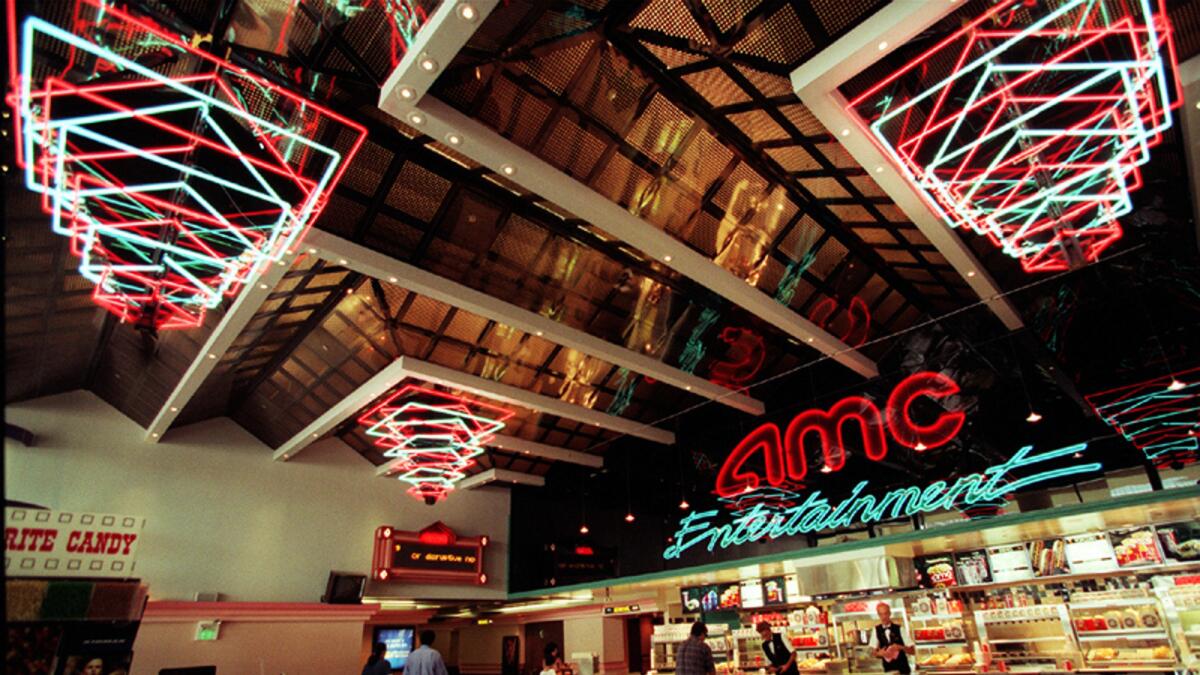Department of Justice probes major theater chains over antitrust claims

- Share via
The Department of Justice’s antitrust division has ramped up its probe into whether the nation’s largest theater chains are violating federal law by preventing smaller rivals from playing movies at the same time, two people familiar with the matter said.
Federal investigators have interviewed at least two theater owners who have alleged that major chains -- Regal, AMC and Cinemark -- were using their market clout to prevent them getting first-run movies, said the people, who asked not to be identified because they were not authorized to comment.
The probe centers on a longstanding business practice known as “clearances,” in which theaters seek to “clear” certain markets, ensuring rivals in proximity cannot play new releases at the same time.
The probe has accelerated in recent months. A task force of experts, economists and lawyers has been assembled to examine the issue and interview theater owners, people familiar with the matter said.
A spokesman for the Department of Justice said, “We’re not in a position to either confirm or deny anything.”
The use of clearances developed after a landmark Supreme Court decision in 1948 that required studios to divest their ownership in movie theaters. Clearances were initially seen as a way to guarantee that small, independent theaters would gain access to first-run films, allowing the industry to grow rapidly.
But as the industry has increasingly consolidated — about half of all theater screens are owned by four companies — tensions between large chains and independent theater chains have escalated. Because they control so many screens, big chains have more leverage with studios in terms of where and when movies play across their circuits.
In 2006, the owners of the Palme d’Or, a seven-screen specialty theater in Palm Desert, sued Cinemark, the nation’s third-largest chain. The owners alleged that Cinemark, which operates the 15-screen River Cinema in nearby Rancho Mirage, was illegally muscling them out of the marketplace by threatening to retaliate against movie studios that book films in the Palme d’Or. The case is pending.
Another legal dispute erupted last year when Cobb Theatres sued AMC in U.S. District Court in Georgia. Cobb, which operates 20 theaters, accused AMC of seeking to block its access to films and drive it out of business.
The latest flare-up occurred last fall when some independent theater chains openly complained that they were being squeezed out by larger rivals.
Veteran theater industry executive Tom Stephenson, chief executive of Look Cinemas, an upscale 11-screen theater in a suburb of Dallas, alleged that his business was threatened when AMC opened a multiplex nearby and used its leverage to keep Look Cinemas from playing new releases. He recently complained about the practice in a letter to studio executives.
According to a confidential memo obtained by the Los Angeles Times, the world’s largest theater chain singled out Look Cinemas and a dozen other mostly independent theaters from Harlem to La Jolla as threats to its business. The document is among the records under review by the government.
Federal investigators interviewed Stephenson in Washington this week to discuss his complaint.
Stephenson declined to comment on the meeting but said: “I am pleased that a number of different government bodies are looking into this notion of whether or not clearances make any sense in today’s world.”
IPic Entertainment, a Boca Raton, Fla.-based chain that operates eleven luxury theaters, including locations in Pasadena and Westwood, also has contacted the Justice Department, alleging Regal and AMC have used the threat of clearances to thwart competition.
“Our issue is that three or four large companies are using zones and clearances to preempt competition and they’re doing it so blatantly, even before we sign a lease,” said Hamid Hashemi, chief executive of IPic. “It’s clearly a scare tactic.”
AMC, owned by China’s Dalian Wanda Group, has countered that clearances are a “well-established industry practice” and that fewer than 10% of AMC’s 342 locations have an allocated film zone. Many clearance zones also include other large chains such as Cinemark and Regal.
“Several years ago, AMC was the last of the major exhibitors to join in this common practice, a delay which had put us at a competitive disadvantage,” AMC said in a statement. “Belated claims made by others about our decision to participate in the request of clearances, while staying silent on the industry practice as a whole, only reaffirms our belief that all exhibitors should play by the same rules.”
Representatives of Regal and Cinemark were not immediately available for comment.
Twitter: @rverrier
More to Read
From the Oscars to the Emmys.
Get the Envelope newsletter for exclusive awards season coverage, behind-the-scenes stories from the Envelope podcast and columnist Glenn Whipp’s must-read analysis.
You may occasionally receive promotional content from the Los Angeles Times.










